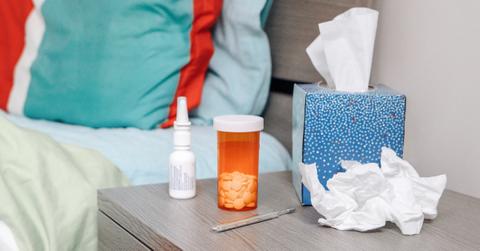CVS Begins Pulling Products With Phenylephrine, a Decongestant Ingredient, off Shelves
Updated Oct. 20 2023, 10:02 a.m. ET

Suppose you're struggling with a cold, a sinus infection, or even worse, a case of COVID-19. In that case, you might find yourself stuffy and wandering down the aisles of a pharmacy, searching for the best medication that can offer decongestants (and, hopefully, a good night's rest). However, as of Sept. 12, 2023, research shows that one of the popular ingredients in many decongestants and allergy medications might not be as effective as consumers hope.
Thanks to programs like the U.S. Food and Drug Administration (FDA), consumers are always in the loop about what products are safe and effective. Here's what you need to know about the discoveries about phenylephrine and what it means if the ingredient is considered "not effective."

An FDA advisory committee claims Phenylephrine, a decongestant ingredient, is ineffective.
On Sept. 12, 2023, an independent advisory committee, the Nonprescription Drugs Advisory Committee, presented evidence to the FDA that phenylephrine, a popular ingredient in many over-the-counter cold and allergy medications, is ineffective as a tablet, per CNN.
Several products containing phenylephrine include Vicks Sinex, Benadryl Allergy Plus Congestion, and Sudafed PE.
The ingredient is not dangerous and is still considered safe to use. Still, during the committee's Sept. 12 meeting, there was a unanimous vote of "no" for the specific question: "Do the current scientific data that were presented support that the monograph dosage of orally administered phenylephrine is effective as a nasal decongestant."

The way phenylephrine works is by "temporarily reducing the swelling of blood vessels in the nasal passages," according to CNN. In typical respiratory infections or allergies, your nose gets stuffy because the blood vessels in your nasal passages get swollen, creating mucus, per Mount Sinai. Decongestants work because they constrict the blood vessels to help fluids drain.
The FDA did tell the committee it would consider this advice but did not give a timeline estimate as to when or if anything would change with the classification.
As of Oct. 20, the FDA has still not made a decision, but plans to turn to public opinion first. Should the FDA agree with the committee, products that contain phenylephrine would be removed from Generally Recognized as Safe and Effective (GRASE) status, and companies would be required to remove their products containing phenylephrine.
On Oct. 19, 2023, CVS Health announced it would be removing certain oral cough and cold products from its shelves that contained phenylephrine in a proactive move, per Reuters. However, the company did say, "Other oral cough and cold products will continue to be offered to meet consumer needs."
Prominent over the counter medications that contain phenylephrine include Advil, Tylenol, Kenvue's, Benadryl, and Haleon's.

A citizen petition from 2015 to the FDA argues that as a pill or a tablet, phenylephrine is metabolized so well that only a tiny bit of it makes it to the bloodstream, where it can help ease congestion. A citizen petition is an official process by the FDA that allows consumers to ask the FDA for changes to health policies.
Thankfully, the Nonprescription Drugs Advisory Committee agreed on Sept. 12 that it did not want the FDA to take action because the ingredient was harmful. Still, rather, the tablets were a "waste of money."
"It's amazing the amount of dollars being spent on something that has really no efficacy," said Dr. William Fig, a committee member.
Changing phenylephrine's designation, however, isn't good news for everyone. According to CNN, The Consumer Healthcare Products Association is opposed to a change, urging the FDA to be mindful of "negative unintended consequences."
This article, originally published on Sept. 13, 2023, has been updated.